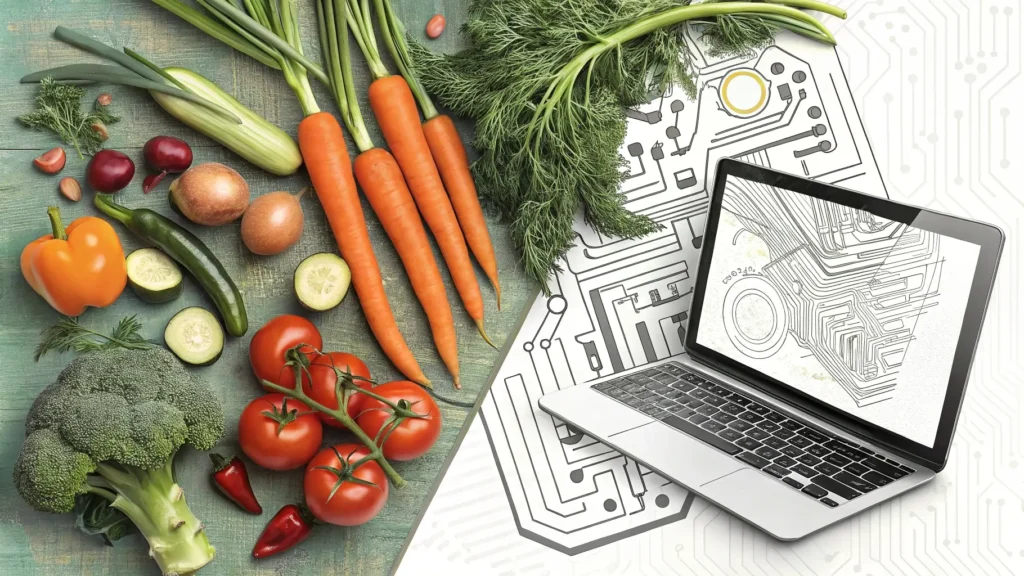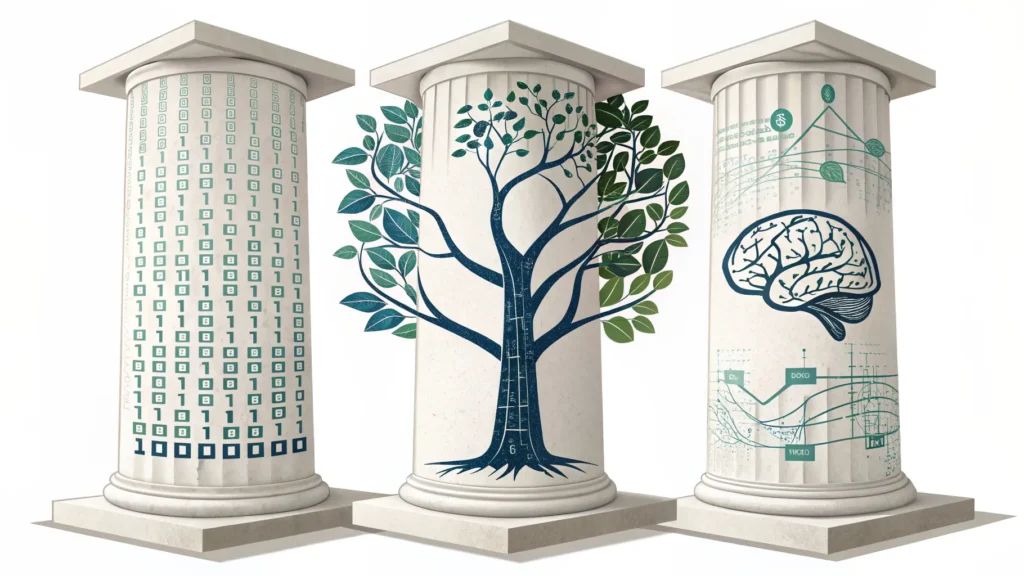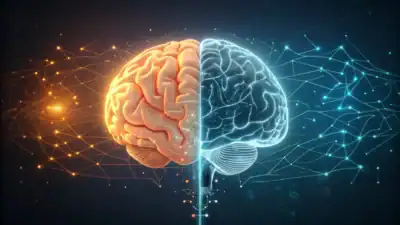Table of Contents
When Silicon Valley Meets Plant-Based Philosophy
Picture this: you’re scrolling through your phone, using AI to find the perfect vegan restaurant, when suddenly you pause. The very technology helping you maintain your ethical lifestyle might be contradicting those same principles. Welcome to the world of AI veganism – a movement that’s making waves faster than oat milk conquered coffee shops.
You might be thinking, “Wait, what does artificial intelligence have to do with my plant-based diet?” Well, buckle up, because we’re about to explore an ethical frontier that’s reshaping how we think about technology, consciousness, and moral responsibility in our digital age.

What Exactly is AI Veganism?
Let me break this down for you in the simplest terms possible. AI veganism isn’t about teaching robots to eat quinoa bowls – though that would be entertaining to watch. Instead, it’s about applying the core ethical principles of traditional veganism to how we develop, deploy, and interact with artificial intelligence systems.
Just as vegans avoid exploiting animals, AI vegans are concerned about the potential exploitation inherent in AI systems. This includes everything from data harvesting without proper consent to the massive environmental footprint of AI infrastructure.
The Three Pillars of AI Veganism
Think of AI veganism as resting on three fundamental pillars:
1. Data Ethics and Consent Your personal information shouldn’t be harvested like factory-farmed data. AI vegans advocate for transparent, consensual data collection practices.
2. Environmental Sustainability Those massive data centers powering AI? They consume enormous amounts of energy, contributing significantly to carbon emissions.
3. Human Autonomy Just as vegans protect animal agency, AI vegans worry about technology undermining human cognitive independence and decision-making capabilities.

The Parallel Universe: How AI Veganism Mirrors Traditional Veganism
Here’s where it gets fascinating. Research from Georgia Tech reveals striking parallels between people’s hesitations about AI and vegans’ concerns about animal products.
Ethical Awakening Patterns
Both movements follow similar awakening patterns:
- Awareness Phase: Learning about hidden costs (environmental impact, exploitation)
- Moral Consideration: Questioning whether current practices align with personal values
- Behavioral Change: Making conscious choices to avoid problematic systems
- Advocacy: Encouraging others to consider ethical alternatives
I find it remarkable how both veganism and AI skepticism stem from a deeper questioning of systems we often take for granted. It’s like waking up and realizing the matrix has been there all along – except instead of red and blue pills, we’re choosing between convenience and conscience.
Consumer Behavior Similarities
| Traditional Veganism | AI Veganism |
|---|---|
| Avoids animal products | Limits AI service usage |
| Reads ingredient labels carefully | Scrutinizes privacy policies |
| Supports cruelty-free brands | Chooses ethical tech companies |
| Concerned about environmental impact | Worried about AI’s carbon footprint |
| Values transparency in food production | Demands algorithmic transparency |

Why People Are Getting AI-Hesitant (And It’s Not Just Technophobia)
Let’s address the elephant in the room – or should I say, the algorithm in the data center? The reluctance many people feel toward AI isn’t simply fear of new technology. It’s often a gut reaction to ethical concerns that mirror vegan principles.
The Data Exploitation Dilemma
Every time you interact with AI, you’re essentially feeding it information about yourself. Your search queries, conversation patterns, preferences – all of this becomes training data. Many AI vegans view this as a form of digital exploitation, where human intellectual labor and personal data are harvested without adequate compensation or consent.
Think about it: when you help train ChatGPT by having conversations, you’re essentially working for free. Vegans might see this as similar to how animals are exploited for their labor, milk, or eggs without any agency in the matter.
The Environmental Wake-Up Call
Here’s a stat that’ll make your reusable water bottle tremble: AI systems can consume as much energy as entire small countries. Those sleek, seemingly ethereal cloud services? They’re powered by massive physical infrastructure that’s anything but environmentally friendly.
AI Environmental Impact Facts:
- Training large language models can produce carbon emissions equivalent to several cars’ lifetime usage
- Data centers consume approximately 1% of global electricity
- AI computations are projected to account for 3.5% of global emissions by 2030
Cognitive Independence Concerns
Perhaps the most intriguing parallel lies in concerns about dependency. Just as vegans worry about the health implications of processed animal products, AI vegans worry about the cognitive implications of over-relying on artificial intelligence.
Are we outsourcing our thinking to machines the same way industrial agriculture outsourced animal welfare to factory farms? It’s a thought-provoking question that deserves serious consideration.
How AI is Actually Supporting Traditional Veganism
Plot twist! While AI veganism critiques certain aspects of artificial intelligence, AI technology is simultaneously revolutionizing traditional veganism in remarkable ways.
Food Innovation Revolution
AI is helping food scientists create plant-based products that are virtually indistinguishable from animal products. Companies use machine learning to:
- Analyze molecular structures of meat to replicate texture and flavor
- Optimize protein combinations for better nutritional profiles
- Predict consumer preferences for new product development
- Reduce food waste through better supply chain management
Personalized Vegan Nutrition
AI-powered apps can now create personalized meal plans that ensure vegans get all necessary nutrients. These systems consider:
- Individual dietary restrictions and preferences
- Local ingredient availability
- Seasonal produce optimization
- Budget constraints
- Fitness goals
Smart Shopping and Product Identification
Ever stood in a grocery store wondering if that random ingredient is vegan? AI solves this daily dilemma through:
- Barcode scanning apps that instantly identify vegan products
- Ingredient analysis that flags non-vegan additives
- Restaurant menu scanning for vegan options
- Supply chain transparency tools
The Psychology Behind AI Veganism
Here’s where things get really interesting. The psychological drivers behind AI veganism often mirror those found in traditional ethical movements, but with unique digital-age twists.
The Consciousness Question
One of the most fascinating aspects of AI veganism involves questions about AI consciousness. Some discussions even explore whether veganism should extend to potentially sentient AI. While we’re not quite at the point of worrying about AI suffering, these conversations highlight how seriously AI vegans take questions of exploitation and consciousness.
Empathy Extension
Traditional vegans extend empathy to animals. AI vegans are beginning to extend ethical considerations to digital entities and the humans affected by AI systems. This includes:
- Data workers in developing countries who label training data for minimal wages
- Content creators whose work is used to train AI without compensation
- Communities displaced by AI automation
- Future generations who’ll inherit our AI decisions
Control and Agency
Both movements emphasize the importance of maintaining agency – vegans choose what they consume, while AI vegans choose how they interact with intelligent systems. This desire for control reflects deeper concerns about autonomy in an increasingly automated world.
Practical Applications: Living the AI Vegan Lifestyle
So how do you actually practice AI veganism? Unlike traditional veganism, where you can simply avoid animal products, AI veganism requires more nuanced approaches.
Digital Minimalism Meets Ethical AI
Level 1: Conscious Consumption
- Read privacy policies before using AI services
- Choose AI companies with transparent ethical practices
- Limit unnecessary AI interactions
- Support open-source AI initiatives
Level 2: Active Avoidance
- Use privacy-focused search engines
- Avoid AI-powered social media algorithms
- Choose human customer service over chatbots when possible
- Opt out of AI-driven personalization
Level 3: Full AI Veganism
- Minimize all AI service usage
- Advocate for ethical AI policies
- Support AI alternatives and human-centered solutions
- Educate others about AI ethics
Building AI Vegan Communities
The AI vegan movement is creating communities similar to traditional vegan groups:
- Online forums for sharing ethical AI alternatives
- Educational workshops about AI impact and alternatives
- Advocacy groups pushing for regulatory changes
- Support networks for those reducing AI dependency

The Future of AI Veganism
What does the future hold for this emerging ethical movement? Predictions suggest AI veganism could significantly influence how we develop and regulate artificial intelligence.
Regulatory Influence
Just as vegan advocacy has led to:
- Better food labeling requirements
- Animal welfare regulations
- Environmental impact assessments
AI veganism might drive:
- Mandatory AI impact assessments
- Data consent standardization
- Environmental reporting for AI companies
- Algorithmic transparency requirements
Market Transformation
The growing awareness around AI ethics could reshape the tech industry much like veganism transformed food markets:
- Ethical AI certification programs
- Human-centered technology alternatives
- Transparent AI development practices
- Sustainable AI infrastructure investments
Cultural Shift
We might see AI veganism contribute to a broader cultural shift toward:
- Digital consciousness and intentional technology use
- Human-first design principles
- Environmental accountability in tech
- Data sovereignty movements
Challenges and Criticisms
Let’s be honest – AI veganism isn’t without its critics and challenges. Like any emerging movement, it faces legitimate questions and obstacles.
The Practicality Problem
In our hyperconnected world, completely avoiding AI is nearly impossible. AI powers:
- Search engines
- Navigation systems
- Banking security
- Medical diagnostics
- Weather predictions
Critics argue that total AI avoidance is both impractical and potentially harmful, especially when AI serves important societal functions.
The Innovation Dilemma
Some worry that AI veganism could slow technological progress that benefits humanity. After all, AI is helping solve problems like:
- Climate change modeling
- Disease diagnosis and treatment
- Accessibility improvements
- Scientific research acceleration
The Privilege Perspective
Like traditional veganism, AI veganism faces criticism about accessibility and privilege. Not everyone has the luxury to avoid AI systems, especially when they provide:
- Essential services for disabled individuals
- Economic opportunities in developing regions
- Educational resources for underserved communities
Taking Action: Your Next Steps
Ready to dip your toes into the AI vegan waters? Here’s how you can start exploring this ethical frontier today.
Start Small
You don’t need to go cold turkey on AI (see what I did there?). Begin with:
- Audit your AI usage – track how often you interact with AI systems
- Research alternatives – find human-centered options for tasks you regularly use AI for
- Read those privacy policies – understand what data you’re sharing
- Choose mindfully – consider the ethical implications of your tech choices
Connect with Community
Find others exploring similar questions about technology and ethics. The AI vegan movement is young, but it’s growing, and community support makes any lifestyle change more sustainable.

Conclusion: Choosing Your Digital Diet
As we stand at this fascinating crossroads between technological advancement and ethical consciousness, AI veganism offers us a framework for navigating our digital future with intention and values-based decision making.
Whether you choose to fully embrace AI veganism, incorporate some of its principles into your tech usage, or simply become more conscious about your digital consumption, the movement raises important questions we all need to consider. How do we want technology to shape our world? What kind of digital legacy do we want to leave?
The beauty of AI veganism lies not in its demands for absolute adherence, but in its invitation to think more deeply about the technologies we integrate into our daily lives. Just as veganism has pushed food industries toward greater transparency and sustainability, AI veganism has the potential to drive meaningful change in how we develop, deploy, and interact with artificial intelligence.
Your turn: What aspects of AI veganism resonate most with you? How might you start incorporating more conscious technology choices into your daily routine? The future of ethical AI isn’t just in the hands of developers and policymakers – it’s in the choices each of us makes every day.
The ethical frontier awaits, and the journey begins with a single conscious click, swipe, or decision to pause and consider the values we’re programming into our digital lives.
Sources and References
This article draws from extensive research and expert insights from leading academic institutions, industry publications, and established organizations in both AI ethics and veganism:
- Georgia Tech News – AI Veganism Research
- The Conversation – AI Veganism Parallels
- Economic Times – Principles Over Processors
- Fast Company – AI Veganism Research Explainer
- Vegan Boss Ladies – AI and Veganism
- Vegan FTA – Veganism and AI Analysis
- Daily Scope – AI Veganism Ethical Movement
- Green Queen – AI Predictions for Veganism
- The Ethicalist – AI Predicts Vegan World
- International Vegetarian Union – AI and Veganism
- Vegan Easy – Vegan FAQs
Frequently Asked Questions
1. What is AI veganism and how does it differ from regular veganism?
AI veganism applies the ethical principles of traditional veganism—opposition to exploitation and harm—to artificial intelligence development and usage. While regular veganism focuses on avoiding animal products and exploitation, AI veganism concerns itself with data exploitation, environmental impact of AI systems, and maintaining human autonomy in an increasingly automated world. Both movements share core values of conscious consumption and ethical decision-making.
2. Can someone practice AI veganism while still being an omnivore?
Absolutely! AI veganism and dietary veganism are separate ethical frameworks, though they often attract people with similar values. You can be concerned about AI ethics, data privacy, and the environmental impact of technology while still consuming animal products. Many AI vegans focus specifically on technology choices rather than dietary ones, though there is significant overlap in the communities.
3. Is it realistic to completely avoid AI in today’s world?
Complete AI avoidance is practically impossible in our modern world, as AI powers everything from search engines to banking security systems. Most AI vegans practice “conscious consumption” rather than complete avoidance—they make informed choices about which AI services to use, prioritize privacy-focused alternatives, and support companies with ethical AI practices. It’s more about mindful usage than total abstinence.
4. How does AI veganism address concerns about slowing technological progress?
AI veganism doesn’t advocate for stopping AI development, but rather for more ethical and sustainable approaches to it. Proponents argue that conscious development practices—including environmental consideration, fair labor practices, and transparency—can actually lead to better, more robust AI systems. The movement supports AI that serves humanity while respecting both human rights and environmental sustainability.
5. What practical steps can someone take to start practicing AI veganism?
Begin with small, manageable changes: audit your current AI usage, read privacy policies before using AI services, choose companies with transparent ethical practices, and explore privacy-focused alternatives to mainstream AI tools. You can also limit unnecessary AI interactions, support open-source AI initiatives, and stay informed about AI ethics issues. Like traditional veganism, it’s often more sustainable to make gradual changes rather than attempting a complete overnight transformation.
Want more to read? Here!
AI-Proof Careers 2025: 25 Ultimate High-Paying Jobs That Robots Can’t Destroy






[…] What is AI Veganism? The Complete Guide to Ethical AI in 2025 […]
[…] What is AI Veganism? The Complete Guide to Ethical AI in 2025 […]